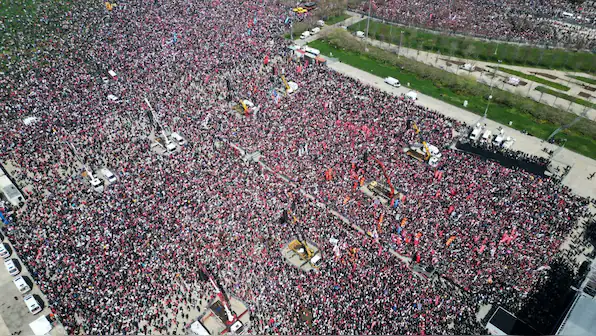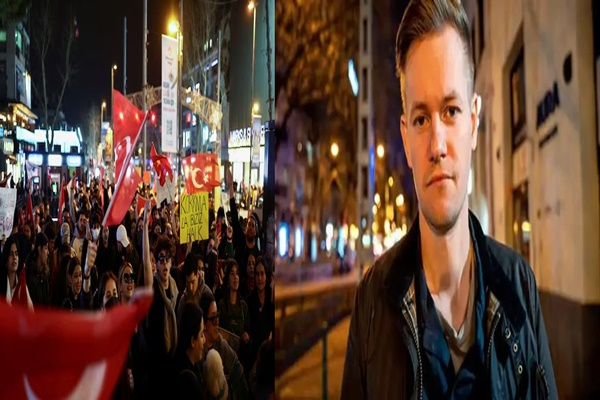Swedish journalist Joakim Medin, who works for the Dagens ETC newspaper, was detained in Turkey upon his arrival on Thursday and later arrested on charges of “membership in an armed terrorist organisation” and “insulting the president.”
His arrest was officially confirmed by the Turkish presidency, which stated that Medin was associated with the banned Kurdish militant group, the PKK. Medin had traveled to Turkey to cover protests related to the jailing of Istanbul’s mayor, Ekrem İmamoğlu, a prominent political rival of President Recep Tayyip Erdoğan.
However, Turkish authorities insisted that his detention was unrelated to journalistic activities. The Turkish government’s “disinformation combat centre” published a bulletin stating that Medin had a history of producing “anti-Turkey news” and was allegedly close to the PKK.
Turkish prosecutors also linked him to a protest in Stockholm in 2023, during which a puppet effigy of Erdoğan was hanged by its feet. The protest angered Turkish officials, who claimed it was orchestrated by PKK members. As a result, Medin became one of 15 suspects believed to have been involved in the demonstration, either as participants, organizers, or publicists.
Upon his arrival in Turkey, Medin was immediately detained and transferred to prison the following day. His arrest came amid a wider crackdown on journalists covering protests related to İmamoğlu’s imprisonment.
Read : AP Journalists Banned from White House Over Gulf of Mexico’s Name
The timing of his detention has raised concerns about press freedom in Turkey, with many viewing it as part of a broader pattern of targeting journalists who report critically on the government.
Arrest and Charges Against Joakim Medin
Medin’s arrest follows an ongoing crackdown on journalists and activists accused of being linked to anti-government activities. Turkish authorities maintain that his case is not related to journalism but rather his alleged involvement with the PKK, which has been designated as a terrorist organization by Turkey, the United States, and the European Union.
However, Medin’s newspaper and supporters argue that these charges are politically motivated and meant to silence critical voices. Turkish prosecutors claim that Medin was under investigation for his role in the controversial Stockholm protest.
Read : Journalist Who Led #MeToo Movement in China Jailed for 5 Years
The demonstration, which saw a puppet representation of Erdoğan being hung upside down, led to strong reactions from Ankara. Turkey accused Sweden of allowing the PKK and other opposition groups to operate freely within its borders.

As a result, Medin was already under scrutiny before he even set foot in Turkey. His arrest was not entirely unexpected, given Turkey’s strict policies against perceived threats to its leadership and national security.
The charges of “insulting the president” have been widely used in Turkey against journalists, activists, and opposition figures. Under Turkish law, insulting the president is a criminal offense that can result in imprisonment.
This law has been heavily criticized by human rights organizations, which argue that it is used to stifle dissent and suppress freedom of expression. Medin’s case is the latest in a long list of journalists who have faced legal action for their reporting or political views.
International Response and Sweden’s Reaction
Medin’s arrest has sparked strong reactions from Sweden and the international journalism community. His newspaper’s editor-in-chief, Andreas Gustavsson, condemned the charges as “absurd,” emphasizing that journalism should not be treated as a crime.
The Swedish foreign minister, Maria Malmer Stenergard, labeled Medin’s case as an “absolute priority” and vowed to raise the matter with her Turkish counterpart. She underscored the importance of press freedom and called for Medin’s immediate release.

The case has further strained diplomatic relations between Sweden and Turkey. In recent years, Turkey has repeatedly criticized Sweden over its stance on Kurdish groups, particularly the PKK, which Turkey considers a terrorist organization.
The Stockholm protest that led to Medin’s legal troubles had already caused tensions, as Turkey accused Swedish authorities of failing to prevent anti-Turkish demonstrations. Medin’s arrest has added another layer of complexity to the already delicate relations between the two countries.
Several international press freedom organizations, including Reporters Without Borders (RSF) and the Committee to Protect Journalists (CPJ), have condemned the arrest and called for Medin’s immediate release.
These organizations argue that his detention is part of a broader trend of press repression in Turkey, where numerous journalists have been jailed in recent years. The international outcry over Medin’s case highlights the ongoing challenges faced by journalists working in authoritarian environments.
Press Freedom and the Broader Crackdown in Turkey
Medin’s arrest is not an isolated case but part of a broader crackdown on press freedom in Turkey. Over the past decade, Turkey has ranked among the worst countries for press freedom, with dozens of journalists imprisoned and many media outlets shut down or taken over by government-friendly entities. President Erdoğan’s government has increasingly used anti-terror laws and defamation charges to silence critical voices.
In recent weeks, Turkish authorities have intensified their crackdown on journalists covering protests against the jailing of Istanbul’s mayor, Ekrem İmamoğlu. Before Medin’s arrest, 11 other journalists were detained in dawn raids for covering the protests.

Among them was AFP photographer Yasin Akgül, who was later released. The BBC journalist Mark Lowen was also deported after being held for 17 hours, with Turkish authorities citing a lack of accreditation and claiming he posed a “threat to public order.”
These actions reflect a broader pattern of media suppression in Turkey. Journalists who report on sensitive political issues, particularly those related to opposition figures, Kurdish rights, or government corruption, often face harassment, legal action, or imprisonment. Turkey’s approach to press freedom has drawn criticism from the European Union, human rights groups, and international media organizations.
As Medin remains in Turkish custody, his case will likely continue to draw international attention. Sweden, along with press freedom advocates, is expected to increase diplomatic pressure on Turkey to secure his release. However, given Turkey’s history of dealing harshly with journalists and dissenters, Medin’s legal battle may be prolonged.
His arrest serves as a stark reminder of the challenges faced by journalists working in politically sensitive regions. It also underscores the ongoing struggles for press freedom in Turkey, where reporting on government affairs can lead to serious legal consequences.
The coming weeks will be crucial in determining whether international pressure can influence Turkey’s stance or whether Medin will face a lengthy legal ordeal.

